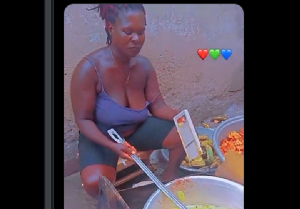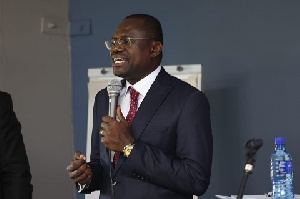If there is a positive outcome to be wrung out of the Atiwa by-election horror show, it appears to have concentrated Ghanaian minds on the possibility of the unmentionable happening in 2012. The mindless but orchestrated violence that happened during that election has for the first time awakened some Ghanaians to the awful conclusion that the NPP-NDC life-and-death struggle can lead this country sleepwalking into civil war in 2012, or after another election in the future. The signs have been there all along, but our political leaders have perfected the ostrich posture over a long period of practice, and if we don’t speak out now, they and their media allies will simply move on as if Atiwa was just a passing phase.
By-elections bring out the worst in our politicians and political parties. The disgraceful scenes at Chereponi and Akwatia are still fresh in our memory, as are the sanctimonious statements of blame and counter blame that followed each of those by-elections. One hoped, perhaps against the evidence, that Atiwa would mark the beginning of a new kind of engagement devoid of extremism and brinkmanship. The irony of it is that in most by elections only one party would realistically emerge as winner. In other countries, such non-marginal constituency by-elections would produce only a few column inches in the national press.
There is no running away from the obvious: what Atiwa demonstrated is that our political parties, especially the NPP and NDC are in hock to the extremists elements in their midst to the extent that despite all the innocent-sounding protestations of the leaderships, here we have a case of the tail wagging the dog. In clear language, this means that the situation may have got to a point where the violent elements dominate these parties, perhaps against the better judgement of the leaders. This is the most generous interpretation that can be placed on the situation that unfolded which was condemned by all but for which no one has taken responsibility so far.
It is a strange situation: party leaders and bigwigs have condemned the violence, which from all indications was organised on both sides, and yet no one appears to have done the organising. Furthermore, it appears that the macho men, as they were variously described, appeared unprovoked but on cue. What the evidence points to is that both the NPP and NDC were determined not to lose the intimidation stakes in what is fast becoming a very dangerous game of dare.
If the Atiwa “game” was a one-off, or a reaction to a specific event or even a series of events, it could be written off as having no particular portend for the future. But as we all know, what happened at Atiwa and previous by-elections form part of a larger game whose logic, while being comprehensible to the inner players, makes no sense to the rest of us, but will eventually lead to an all-consuming explosion.
Elections are the ultimate conflict resolution mechanism because they enable us to make critical choices in a peaceful and supposedly rational manner. Unfortunately, in our part of the world, elections too often do the opposite and lead to war. Just a glance across our shoulders into neighbouring countries will confirm such fears. The Liberian civil war started in essence in the disputed elections of 1985 which was won by the then President, Master Sergeant Samuel Doe. The war in Sierra Leone started even further back in 1967 when the military supremo, General David Lansana placed Dr Siaka Stevens who had won a hotly contested election to become Prime Minister, under house arrest. This prompted a series of coups and counter coups that led directly to the civil war. Ditto Ivory Coast in 2000 when the new electoral law led to disaffection in some quarters, a couple of coups and eventually a civil war.
There was no predestination for war in any of our neighbouring countries; indeed, both Liberia and Sierra Leone had a layer of calm and docility that neatly concealed the tensions within society. In every instance of election leading to violence, it is not the elections per se, but the underlying and festering social tensions that cause the explosions. Above all, ethnicity becomes both the remote and immediate spark for conflict. The Kenya election of 2008 exemplifies that situation beyond words. Ironically, in the midst of the suffering in Kenya, our politicians instead of learning lessons used the misery in East Africa to frighten us and their opposite parties.
History shows us that it is only a short jump from mobilising the “irate” youth to arming a militia. Indeed, a brief history of “land-guardism” shows how a bit of vigilantism on the side can become an uncontrollable social menace. At the moment, the subtext of Atiwa is that neither of the two parties says it can trust the other to play fair, so the macho men help protect ballot bosses. Next they will be used to protect leaders, vehicles, constituencies and the nation. That is how civil wars start – mistrust writ large.
The pity of it is that the two political parties and their media allies live in a parallel universe that is as different from our real world as earth is from Mars. The issues that provoke and motivate them are completely different from the challenges that the millions of people in Ghana face every day. Every morning, representatives of the two main parties troop to broadcast studios to debate the issues of the day, as dictated by newspapers whose editorial functionaries are also highly prized citizens of the self-same parallel universe. The resultant “debate” often borders on low farce.
A newspaper headline could be about, say, electricity tariffs, which would be of interest to all of us. But within two minutes it would develop into a verbal brawl between the NPP and NDC over some obscure point that gets lost just as quickly as it emerged. The main issue also gets lost, of course, but the row continues until another equally slanted slanging match is discovered in some newspaper headline. These days, the NPP and NDC rows are so remote from our reality that I sometimes fear for their collective sanity. For example, I fail to understand how the biggest issue facing the nation when it woke up last Monday was the alleged snub of the NPP leader Nana Akuffo Addo at the Afahye in Cape Coast. Whether Nana was snubbed or not is the not the issue, and neither am I denigrating protocol matters, but was that the biggest challenge facing the nation for which hour after after hour was devoted on radio and TV? Obviously, this was a matter of stinging importance in the parallel universe; in the real world, the challenge continued to be water, electricity, roads, education, health, traffic, bread and jobs.
One reason why our political parties are pandering to their worst elements is that they are not behaving like political parties at all. One of the main responsibilities of parties, especially in between elections, is the political education of their members. When was the last time you heard of any political party organising any event that is not related to elections? The truth is that between elections our political parties are nonexistent. It will be useful to hear from any rank and file member of any political party who has paid any dues in the last 12 months! In the absence of any constructive political or even social work, our political parties use only the incentive of power, or the threat of losing power, to motivate their members. Under such conditions, it is not strange that some party members, especially those with a lot of muscle crying to be used, may come to the strange conclusion that they will rather kill Ghana for the sake of their party. An Akan proverb says that no wise person would mistake his or her tongue for a piece of meat.
Of course, no one would suggest that violence or war “should be our portion”, as the they say in Charismatic Christian circles, and we can deploy strategies to ensure that the next election or by-election would be free of such horror, but that would only be the case if the politicians overcome their cynicism and opportunism. There has to be an abiding faith in togetherness as a project for the country as a whole. The motto of the Presbyterian Church, which is derived from the Gospel according to John 17: 21, comes to mind – “That they all may be one”.
gapenteng@hormail.com
Opinions of Tuesday, 14 September 2010
Columnist: Gyan-Apenteng, Kwasi














